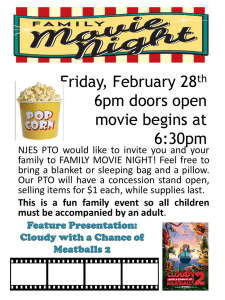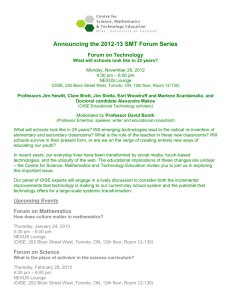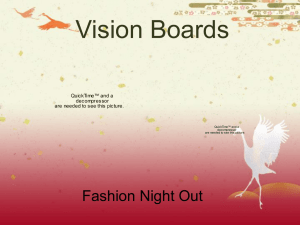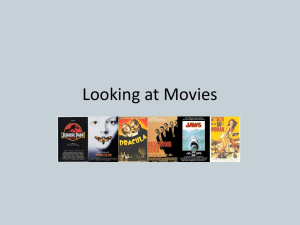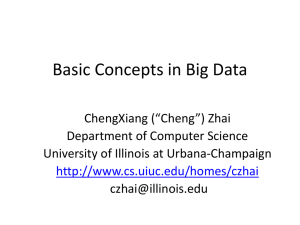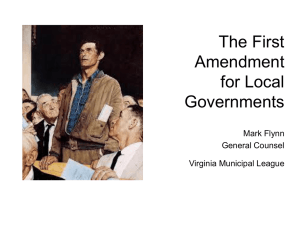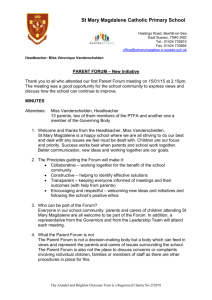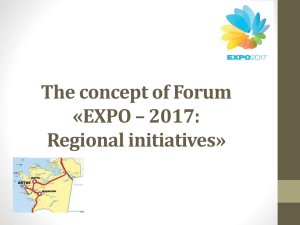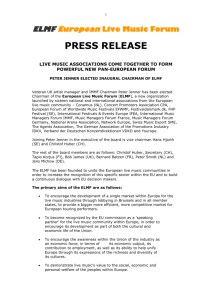PowerPoint Presentation - What is Knowldege Building
advertisement
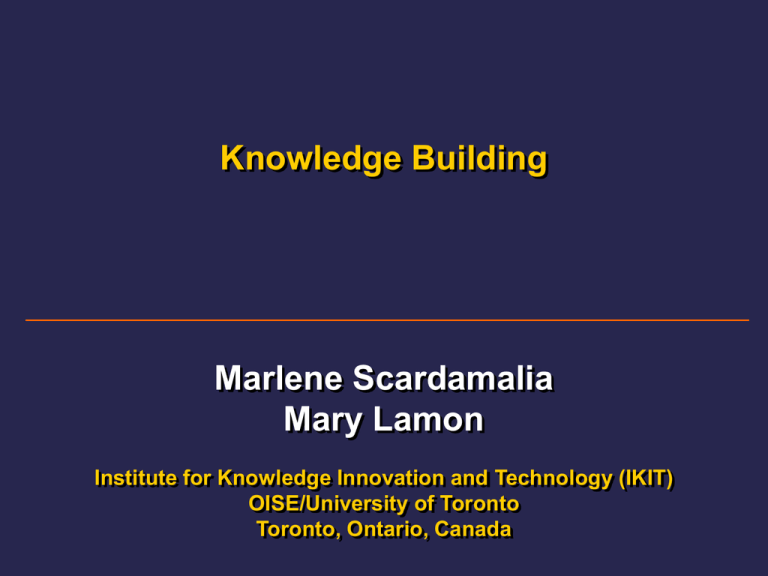
Knowledge Building Marlene Scardamalia Mary Lamon Institute for Knowledge Innovation and Technology (IKIT) OISE/University of Toronto Toronto, Ontario, Canada The Knowledge Society Challenge • Productive manipulation of symbols • Beyond basic literacy • High level of achievement • Beyond learning to creating knowledge Technological and social innovations are simultaneous Technology Innovation Knowledge Forum® - the software Embedding the process of innovation into the everyday lives of knowledge workers Knowledge Forum is a fully component-based Internet-savvy knowledge building environment. Since its inception, Knowledge Forum has been recognized as the leading computer environment for collaborative knowledge building. Used from elementary to tertiary education, health care and community organizations, and businesses. A brief tutorial on the software Hong Kong Knowledge Forum is a multimedia database supporting creative work with ideas. This is a note: the basic way to contribute to the database The body of a note with searchable keywords helps people find others with similar interests. Views contain notes on the same problem or theme. Notes can be moved from View to View as ideas develop. Notes in pink -read; those in blue - not read. This is a quick way to see what you’ve read. Drawing tools Inserting a picture frame This is a new View: Graphics can be drawn or copied as backgrounds. Scaffold supports are like the scaffolds that builders use - they keep the building up and are removed when not needed. References avoid the copy and delete strategy that many students tend to use when writing. Students build on each others’ work QuickTime™ and a Sorenson Video 3 decompressor are needed to see this picture. movie Marlene Scardamalia, the Director of the Institute for Knowledge Innovation and Technology and designer of Knowledge Forum, describes how the software supports knowledge building communities advanced Information technology knowledge-based societies and economies The Social Innovation Knowledge Building Producing knowledge of value to a community, and continually improving it • Starts with the natural tendency to play with ideas • Emphasis is on solving problems of understanding • Community values include continual improvement of ideas, knowledge-building discussions, collective responsibility How the curriculum usually works: From experts to novices What does a revolution in schooling look like? Improvable Ideas All ideas are treated as improvable. Students work continuously to improve the quality, coherence, and utility of ideas. QuickTime™ and a Sorenson Video 3 decompressor are needed to see this picture. movie 1996/1997- Grade 4 students had already made this discovery! Quick Time™ an d a So ren so n Video 3 d ec ompre sso r a re n ee ded to see thi s p ictu re. movie Students set forth their ideas and negotiate a fit between personal ideas and ideas of others. Yes, the curriculum is covered! Everyone builds knowledge: Teachers, researchers and physicists trying to understand how to teach flight to Grade 5 students QuickTime™ and a H. 263 decompressor are needed to see t his picture. movie Knowledge problems arise from efforts to understand the world. Ideas produced or appropriated are as real as things touched and felt. Democratizing Knowledge All participants are legitimate contributors to the shared goals of the community Dialogue with elders in Iqaluit Learning about my stars and movie constellations, [Inuit phrase] People simultaneously building their own knowledge while advancing the knowledge of others Rose Avenue Public School and the Institute of Child Study Community Knowledge Contributions to shared, top-level goals of the organization are prized. movie Beyond Best Practice: Symmetric Knowledge Advancement Harry Camsell School in Hay River, NWT and the Institute of Child Study, ON The Simple Story The more you work with ideas the more you learn the more you innovate The Knowledge Building Trajectory: Everyone Richer • Knowledge that is immediately useful to themselves and their community • Habits of mind conducive to lifelong learning • Connected discourses within and between communities that open new possibilities for barrier-crossing and mutual support Which Way to the Revolution? The Barrier: Knowledge building is a luxury-- to be enjoyed after the basics, after the scores are up. The Challenge: Incorporate creative work with ideas from the beginning. Analysis tools in Knowledge Forum Research Results • Standardized test scores in reading comprehension, vocabulary, and spelling • Ability to read difficult texts • Quality of questions and comments • Depth of explanation • Graphical literacy • Conceptual change • Math problem solving • Portfolio commentaries • Collaborative processes • Inquiry processes Grade 1 Student: Looking to Life Without Knowledge Forum Where will my ideas go? Who will help improve them? For more information please go to http://ikit.org or to http://ikit.org/demo or email mlamon mlamon@kf.oise.utoronto.ca


